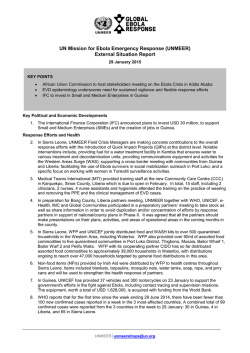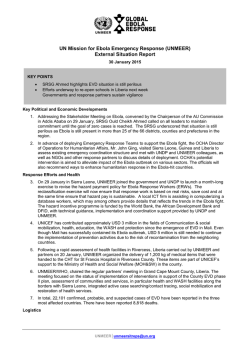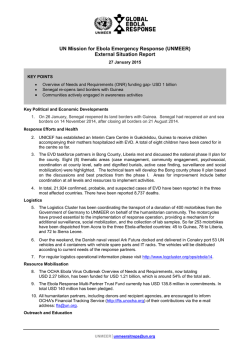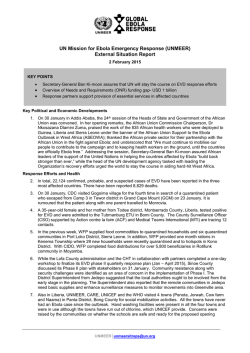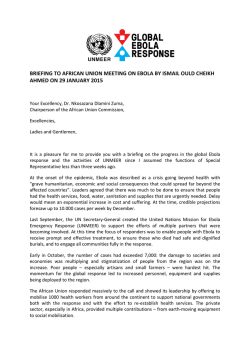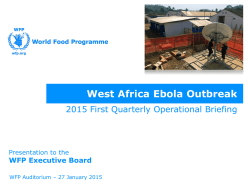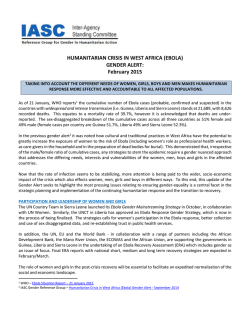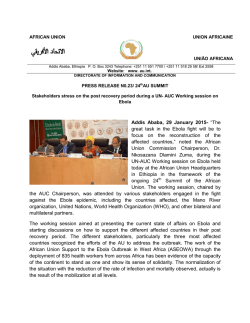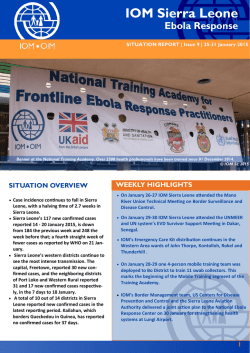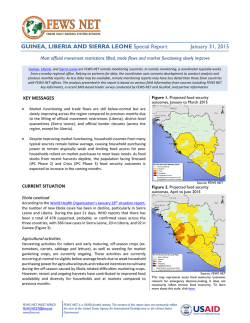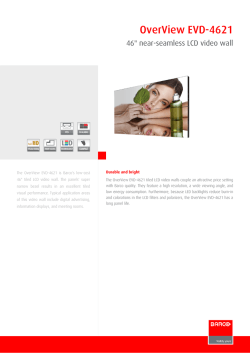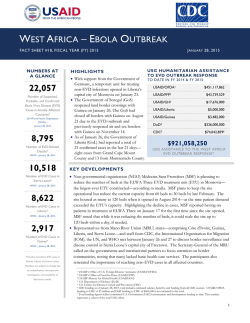
(UNMEER) External Situation Report
UN Mission for Ebola Emergency Response (UNMEER) External Situation Report 28 January 2015 KEY POINTS Mano River Union (MRU) emphasises regional dimension of EVD Local health officials in Liberia remain vigilant on EVD efforts UNICEF continues monitoring activities of re-opened schools in Guinéa Key Political and Economic Developments 1. On 27 January in Freetown, Sierra Leone the Mano River Union (MRU) concluded a 2-day subregional Ebola Technical meeting on border surveillance and disease control, with support from the African Development Bank (AfDB) and UNMEER. Participating were government officials of Guinea, Côte d'Ivoire, Liberia and Sierra Leone and representatives of the CDC, the WHO, IOM and UNCT as well as other response partners. The Secretary-General of the MRU, Dr. Saran Daraba Kaba, described the border communities as isolated and lacking basic services, particularly in the health sector and called on the MRU governments and international partners to refocus attention on those communities and areas. During the meeting, Sierra Leone’s Health Minister, Dr. Abubakarr Fofana, Monty Jones, an adviser to President Koroma of Sierra Leone and Paolo Conteh, the CEO of Sierra Leone’s National Ebola Response Centre emphasized that Ebola will be defeated when all the affected countries register zero cases and there is no transmission after 42 days. The Liberian delegation stressed the need for genuine progress on operationalizing a regional response and building future regional capacities in disaster management and emergency response coordination and proposed the establishment of a regional centre for disease prevention and control supported by the CDC and WHO. UNMEER’s Ebola Crisis Manager (ECM) in Sierra Leone, Mr. Amadu Kamara, reiterated the commitment of UNMEER to support national/regional efforts and highlighted that Ebola could not be defeated without addressing its regional dimensions. Response Efforts and Health 2. In Liberia, UNMEER, CDC, UNICEF, and Global Communities, accompanied the District Health Officer (DHO) of Tappita, Nimba County on an assessment visit to Zuotuo town. The team met with the town chief who shared details on the six deaths earlier recorded in the town. The chief also disclosed that that there is an individual with high fever. The visiting team alerted the Tappita ETU to transfer the person. The tests results are pending. 3. On 27 January in Liberia, a tri-county (Bomi, Gbarpolu and Grand Cape Mount) EVD response coordination meeting was held in Tubmanburg. County Health Officers and Superintendents from these locations and Thomas Ngabe, Head of County Operations at the Incident Management System (IMS) in Monrovia as well as international partners discussed response efforts. Meeting outcome included the establishment of visitor logs at community level; mapping and enhanced management of cross county hot spots; enhanced information sharing on EPI surveillance; shared referral pathways among the three counties: to use the EVD Lab at Sinje ETU in GCM. The meeting which was organized by the Bomi County Health Team (CHT) was facilitated by UNMEER and funded by WHO, Medical Teams International (MTI) and Action Contre La Faim (ACF). 4. In total, 22,057 confirmed, probable, and suspected cases of EVD have been reported in the three most affected countries. There have been reported 8,795 deaths. Logistics 5. WFP is securing contingency stocks of fuel in Guinea as a preparedness measure in case of another minor fuel shortage in the Western part of the country. 5,000 litres of fuel will be secured at fuel stations in Macenta, Beyla and Nzérékoré. Discussions for a similar solutions are ongoing for fuel UNMEER│[email protected] stations in Kissidougou, Guéckédou, Kerouane and Kankan. In addition, stock will also be secured in the Forward Logistics Bases (FLBs) in Kissidougou and Nzérékoré. 6. The Logistics Cluster continues to coordinate free-to-user inter-agency flights from the Europe Staging Area at Cologne Bonn Airport, in order to facilitate the delivery of essential cargo to the affected countries. A flight departed yesterday, 27 January, for Freetown and Conakry, transporting cargo for 13 organisations. An additional three flights are being made available as follows: the first is scheduled for departure on 4 February to Freetown and Conakry; the second for Freetown and Monrovia, and the third to Freetown and Conakry are being arranged. 7. For regular logistics operational information please visit http://www.logcluster.org/ops/ebola14. Resource Mobilisation 8. The OCHA Ebola Virus Outbreak Overview of Needs and Requirements, now totaling 2.27 billion, has been funded for USD 1.21 billion, which is around 54% of the total ask. USD 9. The Ebola Response Multi-Partner Trust Fund currently has USD 135.8 million in commitments. In total USD 140 million has been pledged. 10. All humanitarian partners, including donors and recipient agencies, are encouraged to inform OCHA's Financial Tracking Service (http://fts.unocha.org) of their contributions via the e-mail address: [email protected]. Outreach and Education 11. Lack of information and awareness about EVD transmission remains prevalent across parts of Liberia. At the Sinoe County Taskforce meeting questions were raised on potential animal-human transmission (particularly domestic animals). It was clarified that cases in the current outbreak largely involved human to human transmission. There is also need for awareness on the continued risk of EVD transmission by male survivors for 90 days after the onset of symptoms. Essential Services 12. In Nzérékoré, Guinea, UNICEF hosted an education and WASH inter-cluster meeting to assess the return to school, focusing on achievements and shortcomings. Participants included UNMEER, Plan Guinea, CERADE, IRE, the Red Cross and Enfance du Globe. Participants will develop an action plan and share experiences to better address future shortcomings. In Forecariah, UNICEF visited five urban schools to monitor the use of no-contact thermometers and observe whether students are using hand washing supplies. UNICEF also monitored hand washing at two primary schools in Diécké. 13. In Sierra Leone, 15 business owners have competed for and won a small grant under UNDP’s livelihoods and micro-business initiative. The programme is organized in partnership with the Advocacy Initiative Development (AID) group, an American NGO, and Sierra Leone’s National Youth Commission. Aged 15-35 years old, the entrepreneurs are adapting their practices as markets change and new customer behaviours emerge. These include selling gloves to hairdressers, developing home deliveries, and using mobile money transactions to alleviate fears of handling cash. Upcoming Events 14. On 29 January, UNDP will organize in New York a high-level event on Ebola recovery. From the UN Secretary-General’s initiative, a partnership has developed between the UN, the EU, the World Bank and the African Development Bank to support the national EVD recovery strategies of the affected countries to facilitate governments’ recovery priorities and reach agreement on areas of integrated support. This high-level event is an opportunity to update Members States on progress in this regard and share information on preliminary findings. 15. On 29 January, UNHAS/UNMEER in Sierra Leone will hold a User Group Meeting in Freetown, to among others, discuss Medical Evacuation procedures in light of the recently deployed dedicated Bell 412 helicopter which is currently stationed at the UNHAS/UNMEER helipad rehabilitated by WFP's Engineering Support Team last week at the Cockerill airfield in Freetown. 16. On 29 and 30 January, there will be two meetings held concurrently in Dakar: a consultative meeting on Programme Planning and Support to Ebola Survivors, jointly organised by UNMEER and the UN system; and the second Consultative meeting on Programme for Payments to Ebola Response Workers (PPERW), jointly convened by UNDP and UNMEER. Attachments and resources 17. Reliefweb: Maps on the EVD response UNMEER│[email protected]
© Copyright 2026
